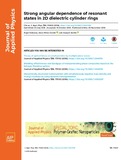Mostrar el registro sencillo del ítem
Strong angular dependence of resonant states in 2D dielectric cylinder rings
| dc.creator | Andueza Unanua, Ángel María | es_ES |
| dc.creator | Pérez Conde, Jesús | es_ES |
| dc.creator | Sevilla Moróder, Joaquín | es_ES |
| dc.date.accessioned | 2019-08-26T11:13:32Z | |
| dc.date.available | 2019-11-05T00:00:13Z | |
| dc.date.issued | 2018 | |
| dc.identifier.issn | 0021-8979 | |
| dc.identifier.uri | https://hdl.handle.net/2454/34678 | |
| dc.description.abstract | We investigate collective resonators made of dielectric cylinders assembled as two-dimensional regular octagons and decagons. These structures exhibit collective resonance states that change their intensity with the incident radiation angle. While most parts of the spectra present small or even null variation, one of these resonances presents high-sensitivity to the incidence angle. This strong variation is well characterized in terms of the electric field intensity distribution of a resonant state where all the cylinders show the lowest order Mie resonance and the neighbors alternate their polarities. The collective state is optimally excited when radiation impinges on a vertex of the polygonal arrangement of cylinders, while the response decreases to its minimum when the incident field hits an edge (two cylinders at the same time). The resonant state and its high dependence on the excitation incidence angle have been found in both octagonal and decagonal configurations for different dielectric permittivity values. In addition, the scalability of Maxwell equations warranties the same behavior if the whole system is downscaled to terahertz or optic frequencies. The study was performed by finite integration time domain calculations of scattering and transmission for different incidence angles. Experimental measures in the microwave range were taken from photonic molecule prototypes made of centimeter-scale glass cylinders (ϵ = 4.5). We find an overall excellent agreement between measurements and simulations. We propose that photonic molecules made of polygonal rings of dielectric cylinders are an ideal structure to build angle sensors using the strongly varying state that they present. | en |
| dc.description.sponsorship | This work has been supported by the Ministerio de Economía y Competitividad of Spain via Project No. TEC2014-51902-C2-2-R. | en |
| dc.format.extent | 5 p. | |
| dc.format.mimetype | application/pdf | en |
| dc.language.iso | eng | en |
| dc.publisher | AIP Publishing | en |
| dc.relation.ispartof | Journal of Applied Physics, 124 (17) | en |
| dc.rights | © 2018 Author(s). | en |
| dc.subject | Photonic molecules | en |
| dc.subject | Resonance states | en |
| dc.subject | Angular dependence | en |
| dc.title | Strong angular dependence of resonant states in 2D dielectric cylinder rings | en |
| dc.type | info:eu-repo/semantics/article | en |
| dc.type | Artículo / Artikulua | es |
| dc.contributor.department | Ingeniería Eléctrica, Electrónica y de Comunicación | es_ES |
| dc.contributor.department | Ingeniaritza Elektrikoa, Elektronikoa eta Telekomunikazio Ingeniaritza | eu |
| dc.contributor.department | Física | es_ES |
| dc.contributor.department | Fisika | eu |
| dc.contributor.department | Institute of Smart Cities - ISC | es_ES |
| dc.rights.accessRights | info:eu-repo/semantics/openAccess | en |
| dc.rights.accessRights | Acceso abierto / Sarbide irekia | es |
| dc.embargo.terms | 2019-11-05 | |
| dc.identifier.doi | 10.1063/1.5047059 | |
| dc.relation.projectID | info:eu-repo/grantAgreement/MINECO//TEC2014-51902-C2-2-R/ES/ | en |
| dc.relation.publisherversion | https://doi.org/10.1063/1.5047059 | |
| dc.type.version | info:eu-repo/semantics/publishedVersion | en |
| dc.type.version | Versión publicada / Argitaratu den bertsioa | es |


